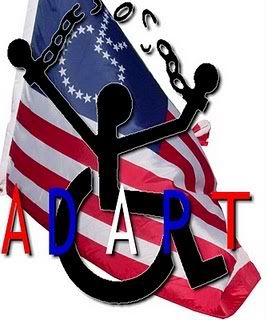
[The one picture I had of me was awful, so here's a picture of the back of my co-presenter's head]
A follow up to Sunday's post. I can't believe I didn't write about this at the time. My brain is moving a bit slow, hopefully I can capture what I want to say. I was asked by a friend last fall to present a one hour workshop on self-advocacy during a conference for disabled girls ages 12-25 (so technically I should have been an attendee, not a presenter, made it awkward in my head). She couldn't make it, I filled in. I started of the presentation the same way I've started every presentation over the last 10 years -- talk about myself.
"I'm Cheryl *censored* I've been involved in advocacy for 10 years. Yadda yadda yadda. 3 years ago I was diagnosed bipolar..."
That's when I was interrupted by an attendee. This woman was 21 or 23 or something and has a cognitive disability, which I would like to be able to blame, but truthfully I blame the media. I blame her disability for her lack of inhibition and willingness to ask, which I am thankful for.
"I heard all people who are bipolar are violent," she said.
I was taken aback and unprepared, and second guessed my response. Being that it's been almost four months since that conference and I'm just writing this now, I don't remember word for word what I said, but here's the gist of it:
"For me," I started, with a stress on the me, "I get very depressed. I spend a lot of time by myself and have a hard time being with other people. There are different kinds of bipolar, and the kind I have means most of the time I am depressed, and I found out I'm bipolar because medication I was on made me not sleep as much and talk too fast, and made me very energized. But then we switched my medication around and everything evened out so that I don't get too depressed and I also don't get too energized."
That's close enough enough to what I said. I took great pains to keep my answer to me. When I went through my trainings we were told to talk about us. I'd spent almost a year and a half at that point going to OOO where we take great pains not to give advice, not to tell someone what to do, but rather share our experience and how things are for us.
So that is what I did, because that is how I've been "brainwashed" to talk about disability. I truly believe that you can't generalize disability because everyone's experience of disability, even the same disability can be so vastly different. I didn't want to say "No, people who are bipolar are not violent," because there are some people, of course, who are. But most aren't (this workshop was before the Giffords incident FYI). Should I have said that? Should I have generalized? Not stuck to just talking about me? I don't know if I actually answered the question. Did I? What do you think?
"I'm Cheryl *censored* I've been involved in advocacy for 10 years. Yadda yadda yadda. 3 years ago I was diagnosed bipolar..."
That's when I was interrupted by an attendee. This woman was 21 or 23 or something and has a cognitive disability, which I would like to be able to blame, but truthfully I blame the media. I blame her disability for her lack of inhibition and willingness to ask, which I am thankful for.
"I heard all people who are bipolar are violent," she said.
I was taken aback and unprepared, and second guessed my response. Being that it's been almost four months since that conference and I'm just writing this now, I don't remember word for word what I said, but here's the gist of it:
"For me," I started, with a stress on the me, "I get very depressed. I spend a lot of time by myself and have a hard time being with other people. There are different kinds of bipolar, and the kind I have means most of the time I am depressed, and I found out I'm bipolar because medication I was on made me not sleep as much and talk too fast, and made me very energized. But then we switched my medication around and everything evened out so that I don't get too depressed and I also don't get too energized."
That's close enough enough to what I said. I took great pains to keep my answer to me. When I went through my trainings we were told to talk about us. I'd spent almost a year and a half at that point going to OOO where we take great pains not to give advice, not to tell someone what to do, but rather share our experience and how things are for us.
So that is what I did, because that is how I've been "brainwashed" to talk about disability. I truly believe that you can't generalize disability because everyone's experience of disability, even the same disability can be so vastly different. I didn't want to say "No, people who are bipolar are not violent," because there are some people, of course, who are. But most aren't (this workshop was before the Giffords incident FYI). Should I have said that? Should I have generalized? Not stuck to just talking about me? I don't know if I actually answered the question. Did I? What do you think?

















3 comments:
I think that you needed to say that most people with bipolar are NOT violent, and it is a condition that CAN be treated with medication. (If the person with bipolar will take it.....my husband has a hard time taking meds as he is usually in a manic state, which he ENJOYS.....)
Thanks for commenting. I don't even think that unmedicated manic people are all that much more likely to be violent then anyone else. Sexually, financially, & otherwise much more irresponsible, yes, but irresponsibility isn't violence.
I think you were on the right track--I know the feeling. I do a lot of online adovocacy for my disorder--Tourette Syndrome. They often ask if everybody/why "everbody" with Tourette's swears all the time. And I feel it's my responsibility, if I answer at all, that I must acknowledge both the majority of TSers who do not have swearing as a symptom, and the minority--myself included, who do. And mention how very embarassing it is to go to Walmart or somewhere else public, and be yelling or even just whispering--things you wouldn't say if you could control it. And also put in perspective how disabling, physically, TS can be too...and yet how many people with it are not disabled by it other than social anxiety it causes...and yadda yadda yadda! I know all about the meds issues--people with Tourette's are given dopamine blockers--yes, say hello to Haldol, Fluphenazine, Risperdal, Abilify, etc etc. As first line treatments. And on those medications, I had horrible depression...my CNS doesn't like its dopamine to be messed with... It's such a mixed-up world, it is, with these labels and those of us who advocate--I want to say what is true but also put a better spin on the common stigmas pertaining to my condition--and that's exactly what you're trying to do, as well. It's very difficult, getting that medium of understanding vs stigma, and yet adhering to satistical fact. And, yeah, most with Bipolar, schizoaffective, and Tourette's, and CP--are not violent. But some are. And who's to say, if those who are, had better outlets for their frustration would be less apt to violence?
Post a Comment